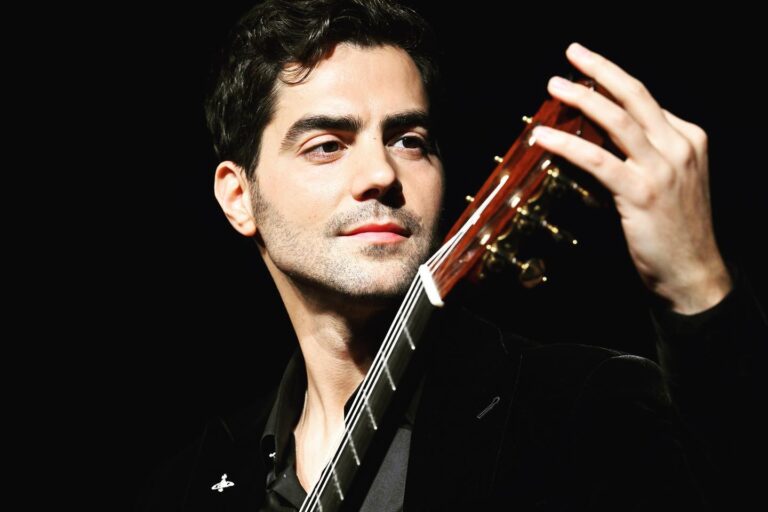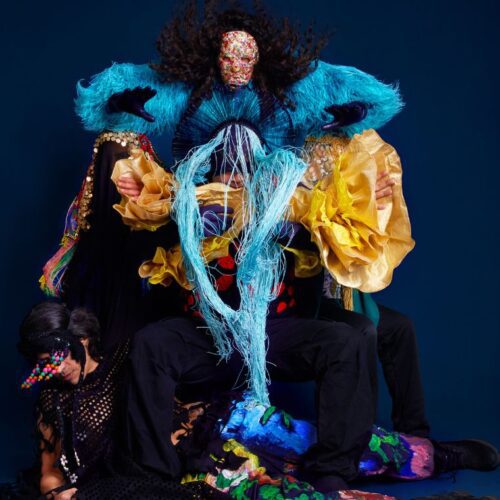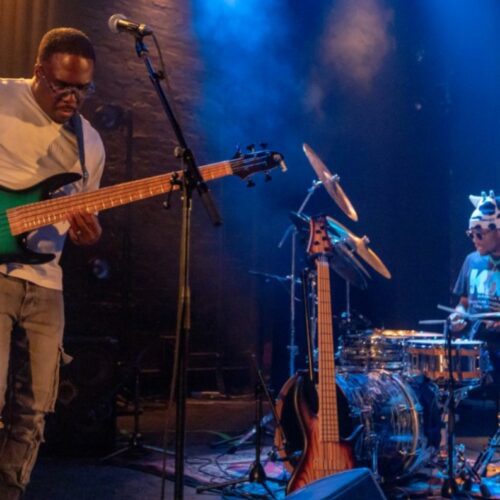Additional Information
This week in Montreal, the American-Colombian maestra Lina González-Granados conducts the Orchestre Métropolitain in 4 different venues including the Maison symphonique. The colors will be Andean, Mexican, Spanish, starting with the East European soloist MILOŠ in the famous Concierto de Aranjuez for guitar and orchestra by Joaquín Rodrigo.
Miloš Karadaglić has become one of the most illustrious virtuosos of the classical guitar, performing in the most important concert halls and festivals around the world. His first three recordings for Deutsche Grammophon certainly helped to make him an authentic guitar hero of classical music, starting with the recording of the Aranjuez Concerto with the London Philharmonic under the direction of Yannick Nézet-Séguin. Today, Miloš is recorded by Decca Classics. He lives in London and performs on a 2007 Greg Smallman guitar.
Miloš has also been involved in crossover music, performing the Beatles’ repertoire in his own way, with duets with singers and musicians such as Gregory Porter, Tori Amos, Steven Isserlis or Anoushka Shankar.
In Canada, Miloš has already joined the National Arts Centre Orchestra in Ottawa in May 2019 to perform another concerto written especially for him, The Forest by Howard Shore. In 2021, Miloš released his sixth album “The Moon and the Forest”, which includes Talbot and Shore concerti as well as Ludovico Einaudi’s “Full Moon” and Robert Schumann’s “Traumerei”.
A true spokesman for the classical guitar worldwide, Miloš regularly acts as a radio and television presenter. He is also an avid promoter of music education, being the patron of the Mayor of London Fund for Young Musicians and the Awards for Young Musicians.
Reached in New York before his OM concert series, MILOŠ discusses the challenges of being a classical guitarist playing with a symphony orchestra, as well as his responsibility as a soloist and promoter of his favorite instrument.
PAN M 360: The main melodic theme of Joaquín Rodrigo’s Concierto de Aranjuez is widely known beyond the classical audience. In the jazz world, it has been adopted by Chick Corea (“Spain”) and Miles Davis (“Sketches of Spain”). So now you are one of the leading soloists in the classical world to perform this essential concerto with a symphony orchestra.
Miloš Karadaglić: Well, it’s a piece that has followed me throughout my career, and throughout my growth as an artist. Yes, because I first learned it when I was a student at the Royal Academy of Music in London. And, and I remember, it was very nice to have it in my fingers the first time, because it’s such an iconic work. And it’s perhaps the most recognizable work for the classical guitar in the repertoire. It’s also a challenging piece, because you know, everybody knows this piece for its beautiful melodies in the second moment. But actually, Joaquín Rodrigo himself was not a guitarist. So, although he was able to write sounds that were perfect for the guitar, he didn’t always manage to write very dramatically so that it would work very well on the guitar. So, as is always the case with his music, every musician has to find their own way with any of his songs. There is almost no standard way to play and do any of his work. Nevertheless, it has been over the years a rite of passage for so many young artists. Whenever you are invited to play with an orchestra, the Aranjuez Concerto will probably be the first piece for me. Personally, I felt I was really ready to play it when I recorded it for Deutsche Grammophon in 2014, which was with the London Philharmonic. So that was an important moment for me. But what’s the interesting thing about this performance? I never felt like this piece locked into one version; I felt like it was always evolving into a different version depending on the orchestra and the conductor and the ensemble and the circumstances of the performance. And I think that’s also partly because we guitarists very rarely have the privilege of playing with a big orchestra.
PAN M 360: Yes, there are not so many pieces for classical guitar and orchestra, even for the best instrumentalist to get a few concerts with a large orchestra, because of the small number of works and also because of the very nature of the instrument whose natural volume is relatively low for a symphonic construction.
Miloš Karadaglić: You know, classical guitarists don’t have many great opportunities to play with symphonic orchestras. So I felt a huge weight on my shoulders in the years 2014, 2015 and 2016, when I was on tour. Suddenly, in my calendar, I had the Chicago Symphony, the Cleveland Orchestra, the Philadelphia Orchestra, the L.A. Philharmonic, Rome, Munich, London, etc. It was an incredible responsibility for me, and of course a dream to play with these orchestras. I learned so much from these experiences but I was not always comfortable, because these big orchestras are not always used to accompanying a guitar that often needs to be amplified. As such, I really had no one to learn from. At that time, I didn’t travel with my own little amplification, I relied more on the ensemble and how it sounded, the sound engineer in the room and the conductor. And that kind of puts you in a very vulnerable position. Because when you’re there, you’re supposed to be making music. But what always happened was that the moment you went to a concert, you were making music, and people responded to that music in such an intense and wonderful way. So I think for any guitarist, it takes a long time to develop the level of confidence that when you’re in front of a big orchestra, you can say, “Okay, I know exactly what I’m doing. And I know exactly how I want each note to sound.”
PAN M 360: You had the opportunity to think about it more during the pandemic, so what happened?
Miloš Karadaglić: It was maybe the only time in my career, and I think it’s the same for a lot of musicians, where we were able to recap, recalculate, calibrate, and re-evaluate everything we learned. And also realize that what we’re doing is an incredible luxury. And that the joy of making music is more important than any approval, or anything that normally surrounds our lives as artists. So now when I go to play, there are these concerns, I feel very different than I did a few years ago, because I feel like now I know exactly what I’m doing. And I know exactly what’s going to happen. And that’s a really great feeling and very rewarding.
PAN M 360: Playing an acoustic guitar with a large orchestra is always a challenge because of the volume differences. That also explains why the instrument itself is not used much in large orchestras. So now, maybe the problems can be different. How do you see the role of a classical acoustic guitar soloist changing with large ensembles?
Miloš Karadaglić: I take it very seriously. For example I have to intervene with the artistic directors, because I feel that we have evolved so much and there are now so many more individual possibilities. For that, you have to know how to solve this equation of the volume of the instrument: it’s not just sticking the mic on the guitar anymore because the volume of the guitar depends also on the way you play it. And if you’re a soloist on an international tour, the sound is very, very different from a guitarist competing in front of a jury. You have to play in front of 1000 to 2000 people. Often you’re not amplified and so that means you have to amplify the sound in the way you play. And that means a lot more power and tension in the fingers and hands. And you really have to know how to balance that tension, that action and reaction in the hands. And it’s, it’s like learning to play again. And, for me, it’s been such an amazing transformative process, which has really happened playing with all these orchestras and playing in these big, big, big concerts over the years.
PAN M 360: Do these adjustments have a real impact?
Miloš Karadaglić: Absolutely. And then you have to take stock of everything you’ve learned and then use the influence you generate as an artist to inspire the next generation of composers to write new orchestral works for solo guitar. It’s a very exciting process, very exciting! So, we need to continue to expand those barriers, and that beauty that we’ve gained can attract an audience to the guitar. And then it’s your role as an artist to take that audience with you on a journey further into another repertoire.
PAN M 360: Have you ever worked with the Colombian-American maestra Lina Gonzalez-Granados who will be conducting the Orchestre Métropolitain de Montréal with you?
Miloš Karadaglić: I have never worked with her but I have heard wonderful things about her from my colleagues and friends. As for the OM, I have only worked with Yannick Nézet-Séguin (with the London Philharmonic) but I feel in good hands with his orchestra. Because even if I have never worked with this orchestra, it is thanks to Yannick that I feel particularly close to it. So I have to say that what impresses me the most is that the OM has organized this concert in four different places in the city. Many orchestras wait for the public to come to them, which is not the case with OM. Knowing Yannick, I realized that it must be his initiative, because he is that person who always goes to the public. He has this incredible gift. So I am very impressed that there are four performances with OM.
PAN M 360: Do you still have a strong connection to Montenegro where you were born and raised?
Miloš Karadaglić: I left Montenegro a long time ago, 23 years ago, yes. But I never lost my ties to my native country, simply because I realized that I could give a lot back. And, and the things that I’ve learned doing what I do, I can share and it’s, it’s a very small country, and in a country, which is the smallest country there is, you kind of become a national hero because it’s such a small country. And I think you can experience that in different ways. But the way I use it is to open people’s minds, to educate the younger generation, to inspire them with your own actions, and to try to support them if they’re trying to go study abroad or get a scholarship. And, and this gives me immense pleasure. I’m actually in the process of starting my own foundation. And it’s really the project of a lifetime, because I think that we should support the talented young people in this region of the Balkans, which is so troubled by politics. I was lucky to have a better life elsewhere; to have discovered the guitar, so young, in Montenegro in the 90s, was for me an exceptional chance. It opened up a world radically different from mine, and it changed my life completely. And that’s the power of music: wherever you live and whatever the circumstances, you are able to create this beautiful world around you. It has nothing to do with the outside world. A true gift of life!
PAN M 360: Do you think you have a responsibility in this sense?
Miloš Karadaglić: It’s something I take really seriously. I think the key is to educate people towards music, not that everyone has to become a world or classical music star, absolutely not. On the contrary, there are less and less opportunities to succeed, our music industry is in danger. I rather think that access to education allows you to be sensitive to music opens your eyes in a multitude of ways. Yes, it starts with education. And it starts with ideas like the Orchestre Métropolitain performing the same program in four different venues.























